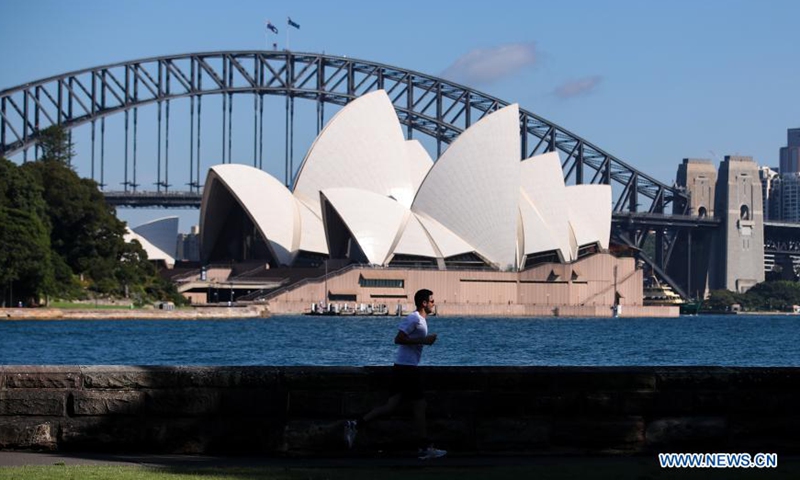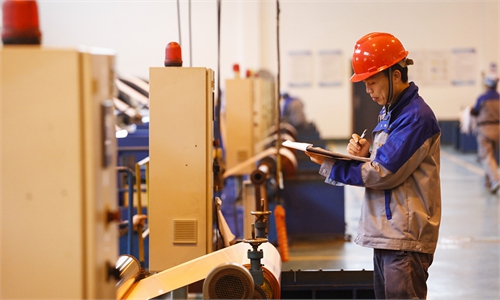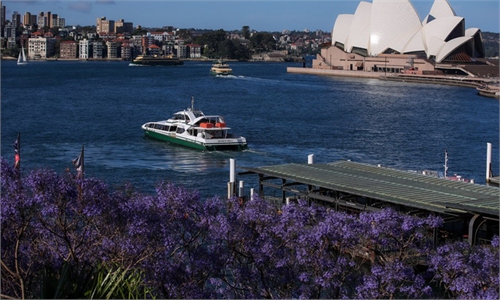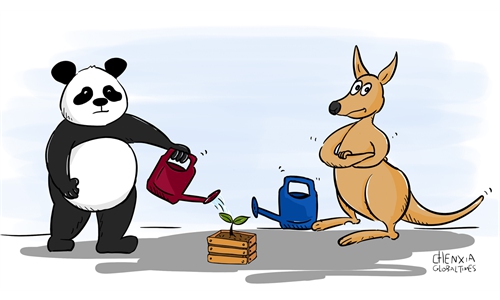
A man runs in a park opposite the Sydney Opera House in Sydney, Australia, on Feb. 26, 2021. Restrictions in the Australian state of New South Wales (NSW) will further ease from Friday as vaccination rolled out and "no local case" status continued. (Xinhua/Bai Xuefei)
According to an exclusive report from the Australian Financial Review, the Australian Defence Force (ADF) was planning for a potential worst-case scenario if the US and China clashed over the island of Taiwan, which promoted debate over the scope and scale of Canberra’s contribution.
The debate regarding Australia’s potential involvement in the Taiwan question has always been in the interest of Australia’s political, academic and media circles. Just this month, Australia’s SBS News and ABC News both discussed how Australia could be dragged into a war if a conflict between China and the US occurred over Taiwan.
The Australian military deeply knows that the Taiwan question concerns the core interest of China and if Australia uses force against China, China will definitely deal a heavy blow to Australia. Therefore, the Australian military has taken a cautious attitude in voicing opinions about the Taiwan question. The Australian government does not act in the same way as the US does on the Taiwan question either.
Australia is geographically far from Taiwan. It serves more as an advanced base in the Asia-Pacific and a supply base for the US. US forces have deployed marines and bombers to its base in Australia. The Australian Defence Force comprises of only around 60,000 permanent personnel, and the number of forces that it could devote to a war effort is even less.
If Australia wants to get involved in the Taiwan question, it will consider whether China will use its forces to strike back at Australia, and if so, whether the US has the ability and will to protect Australia. That is what worries the Australian military most. To its dismay, the US would probably protect itself once a crisis occurs, and the Australian military must weigh up what losses a war would incur to Australia.
This is why Australian Defence Force Chief General Angus Campbell indicated last Thursday that Australia would keep pushing for peaceful dialogue as he believes the outbreak of a war over Taiwan would be “disastrous” for the region.
The remarks came a few days after former defense minister Christopher Pyne said in a speech at the University of Adelaide that the likelihood of a “kinetic war” in the Indo-Pacific was becoming higher, and the trigger that could pull the US and its close ally Australia into it was Chinese forces entering Taiwan. This shows that the considerations of Australian politicians and military are different. Politicians only think about wooing the US to gain more political support.
Not only Taiwan, the South China Sea has also been deemed by Australia as a flash point where it faces the risk of being dragged into a war. The reason that Australia keeps testing the issues that matter to China’s core interests is that it hopes Washington would take more note of Australia’s swaying attitude in key China matters so that it can ask for more favors from Washington. Meanwhile, it wants to sound out China’s response and see how much importance China attaches to questions of Taiwan and the South China Sea.
China-Australia relations, once characterized by strong trade bonds, have been in a state of deep freeze. Australia acts recklessly against China because China highly depends on Australia for iron ore – China imports 60 percent of its iron ore from Australia. But Australia shouldn’t miscalculate China’s determination in safeguarding its core interests, especially Taiwan. And China is actively seeking alternative iron ore markets in Africa.
China could voice out criticism against Australia at appropriate times in order to halt its intention to get involved in the Taiwan question. Meanwhile, it should draw a red line and make clear to Australia the consequences so as to cut down Australia’s illusion that it could use the issue together with the US to provoke China and exploit geopolitical gains.
The author is chief research fellow at the research center for Pacific island countries of Liaocheng University in East China's Shandong Province. opinion@globaltimes.com.cn



